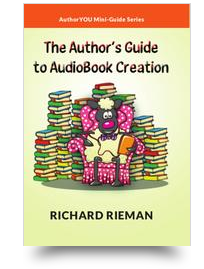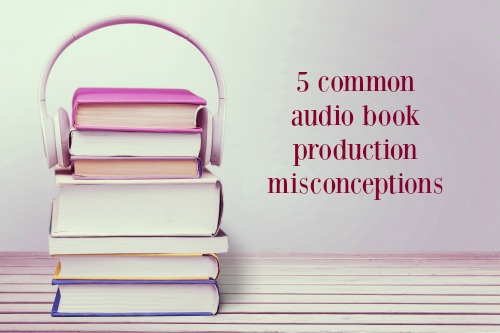Guest post: 5 common audio book production misconceptions
Today’s guest blogger, Richard Rieman of RRVoice.com, is the author of The Author’s Guide to AudioBook Creation. He’s also an audio book self-publishing expert and a top Audible narrator. Richard has narrated dozens of titles on Amazon, Audible, iTunes, and more. He also produces audio books for authors voicing their own audio books and consults authors seeking a narrator.
Guest post: 5 common audio book production misconceptions
By Richard Rieman
Do you ever wonder if an audio version of your book is a good idea?
Maybe you listen to audio books – perhaps a Harry Potter book with Jim Dale doing more than 150 voices – and you think that it’s probably way too complicated or expensive.
Not necessarily!
It’s not as hard as you think if you do a little research and know what you’re getting into first. Like anything else in the book publishing business, the more you know about how to do it, the better your end product will be.
If you’re an audio books rookie, you’ll want to get smart about these five common audio book misconceptions now:
1. Audio books aren’t popular enough to make this worth my while.
E-book popularity is waning, but audio book listening on Audible grew 38 percent last year. Audio book sales growth is up 20 percent worldwide two years in a row.
Smartphone listening is the fastest growing method for enjoying audio books, so automakers such as Honda and GM are now including audio book apps from Audible and iTunes in new cars.
Audio books also have their own fan base, so it’s a way to sell more books.
2. It costs a lot to create an audio book.
As recently as 10 years ago, audio books could cost $30,000 or more to produce. Getting a recording studio, voice actors, audio editors, music rights, and more meant that this was the realm of major publishers, not individual authors.
Now, thanks to the growth of self- publishing in the audio book world and the explosion in the number of narrators with home studios and editing skill, high quality audio books can be produced for less than $3,000. If you’re willing to share your royalties with a narrator/producer, the upfront cost can be reduced to several hundred dollars or less.
Amazon created ACX (the audio book Creation Exchange) to make it easy for you to find narrators for both fiction and non-fiction titles at a relatively low cost.
 3. It’s okay to settle for a good voice instead of an actor.
3. It’s okay to settle for a good voice instead of an actor.
When choosing a narrator, you can easily be seduced by a beautiful voice. But what you need to look for is a voice actor who can distinguish characters by subtly using different vocal tones and inflections and glide easily into the changing emotions of your story. A skilled narrator can hold your interest for hours by talking to you, not by reading to you out loud.
4. You can narrate it yourself easily.
There are a few good reasons to narrate you own book:
- It’s your book and words, so you can tell your story best. You know your characters, story, or subject, as well as the thinking behind your words, better than anyone else.
- You keep more money. If you pay a narrator, you will either share royalties or pay them upfront to produce your audio book. When you narrate your own, your royalty payments go to you (after your publisher or Amazon take its piece of it).
- You have acting or radio/TV experience or have done lots of public speaking.
None of the above? Then get a professional to do it.
It really is a lot harder than it looks. Do you really want the bad reviews that come from a poor narrating performance when listeners judge you against the professionals?
5. You don’t have to promote your audio book.
It’s great to produce an audio book, but if it falls in the forest, does it make a sound? Your audio book needs to be shouted out to your fans and new listeners.
Here are some tips:
- Include an audio book sample in all promotions. The “retail sample” required by ACX is ideal for this. Your book cover and audio clip can be used in all social media and your website.
- Request listener reviews from all your contacts and use a review service like Audiobook Boom.
- Create a promotional video like this one for my book. You can hire a book trailer expert or use a resource like Animoto for less than $100.
- With future books, try to time your audio book release with the print and e-book versions so all of your efforts can simultaneously share your promotion efforts.
Not all books are suited to audio versions, but many are. Why not take advantage of the opportunity to reach more book lovers through another medium?
What do you notice about the narration of an audio book? What stands out for you?
Like what you’re reading? Get it delivered to your inbox every week by subscribing to the free Build Book Buzz newsletter. You’ll also get my free “Top 5 Free Book Promotion Resources” cheat sheet immediately!



I held off producing an audio edition of my book for two years before I attempted it — mostly because I don’t like listening to audiobooks, and I felt icky about selling a product to readers that I wouldn’t enjoy myself. I was lucky enough to get sponsorship through ACX, which helped me attract a lot of audition samples. I don’t sell as many audiobooks as I do ebooks and print books, but the profit margin is higher for audiobooks so it balances out in the end.
Thanks for this feedback, Abria. You’ve brought up something important: We tend to make these kinds of decisions based on what we like or want, rather than on what our target audience likes and wants. I’m guilty of this, too. But it’s important to keep the end user in mind — what appeals to them? What will work best for them? Using book covers as an example, a male author asked for my feedback on 3 sample book covers for a self-help book targeting women. He loved all of them, and why shouldn’t he? They were all dark and very masculine — they were perfect for an audience just like him. Except he wrote his book for women. I didn’t succeed in convincing him that the book cover had to appeal to his readers, not him. I wonder how many women saw his book and thought it wasn’t for them.
Good for you for taking that leap of faith. Sounds like it was smart one!
Sandy
Sandra,
Thank you for the subject article concerning an additional, sensible approach to the market.
Btw, my product is coming slowly (life and family issues to manage). But I also have to admit to enjoying reading and the research (some relevant, some not) which fills time not spent typing. Elmore Leonard would have a fit.
Best,
Dan
Glad you liked it, Dan. I think one of the best ways to become a better writer is to read, read, read, so maybe Elmore Leonard would be proud of you!
Sandy